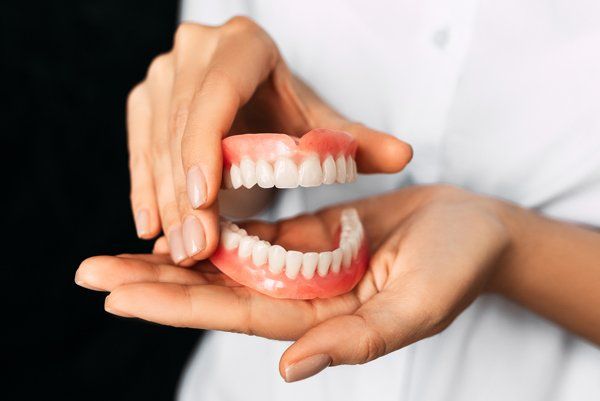Why Dry Mouth Can Be a Problem for Denture Wearers

If you are missing most of your teeth, then you may want to consider getting full dentures so that you can eat and speak without a problem. Dentures can restore your smile and reduce appearances of sunken cheeks from missing teeth and deteriorating jaw structures. However, if you suffer from xerostomia, or dry mouth, it may be harder for dentures to stay securely in place.
Read on to learn more about dry mouth, why it's an issue for denture wearers, and how to fix the problem.
What Is Dry Mouth and What Causes It?
Dry mouth occurs when the salivary glands in your mouth don't produce enough saliva. If you suffer from dry mouth, you may have symptoms like:
- Dehydration
- Sore throat
- Impaired sense of taste
- Chapped lips
- Bad breath
- Gingivitis
While people tend to develop dry mouth as they age, this condition may be a side effect of other conditions, like sleep apnea or diabetes. Dry mouth can be a side effect of medications or certain treatments, like radiation therapy. It can also be caused by habits such as smoking.
Why Is Dry Mouth a Problem for Denture Wearers?
Although dentures are supported by your alveolar ridges - the jawbones that hold your tooth sockets - they are also held in place by suction. If you have dry mouth, it may be harder for your dentures to stay in place since you won't have enough saliva for the dentures to suction to the soft upper palate and the lower alveolar ridge.
Besides reducing retention, dry mouth poses a few other problems for denture wearers. Dentures that dry out too much can warp and you'll have to get refitted for new ones - that's why it's so important to take them out at night and put them in a wet cleaning solution. Dentures are made of strong materials, but if they become too dry, they can become brittle and break if you accidentally drop them.
People with dry mouth are more prone to developing yeast infections, like thrush. Thrush can cause white lesions on the tongue and inner cheeks and may cause sore throats or difficulty eating. This kind of infection can make it difficult to wear your dentures comfortably. Plus, thrush and other bacteria could contaminate the dentures and cause repeat infections if they aren't probably cleaned.
How Can You Fix the Problem?
If your dry mouth is caused by certain medications, then you may want to talk with your doctor about alternative options. It's a good idea to avoid tobacco products if possible and to stay well hydrated.
If you aren't able to eliminate symptoms of dry mouth, ask your dentist about products that can aid retention. There are some denture adhesives that are meant to moisturize gums and create a strong seal with the dentures.
When you take your dentures out at night, be sure to change soak them in a specialized cleaner that has a fresh solution every night. You may not be able to completely eliminate dry mouth, but cleaning and storing your dentures properly can keep them from drying out.
Lastly, if you are still weighing your options with different types of dentures, you may want to consider implant-secured dentures. These types of dentures are fixated to about four to six implant posts in the jawline. The posts are permanent, but the dentures can be popped on and off.
These types of dentures can reduce dry mouth because the implanted posts help to maintain the integrity and health of the jawbone since the bone tissues are exercised when you chew. These actions, in turn, can encourage better saliva flow.
Reach out to us at Rabel Family General Dentistryfor more information about dry mouth and how it may affect your dentures.






